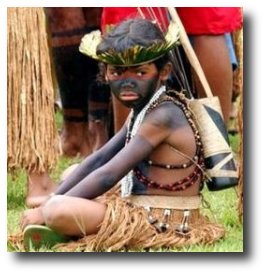 When I was organizing a video festival in London earlier this year, I had the privilege of meeting a campaigner from Survival International, an organization that works with tribal peoples all over the world, with special focus on land issues. One of the videos I had chosen was about the Enawene Nawe, a tribe that lives on the edge of the Amazon basin and whose colourful, cheerful way of being makes you warm up to them instantly. They are also one of the few tribes in the world who eat no red meat, therefore fish is the main staple of their diet.
When I was organizing a video festival in London earlier this year, I had the privilege of meeting a campaigner from Survival International, an organization that works with tribal peoples all over the world, with special focus on land issues. One of the videos I had chosen was about the Enawene Nawe, a tribe that lives on the edge of the Amazon basin and whose colourful, cheerful way of being makes you warm up to them instantly. They are also one of the few tribes in the world who eat no red meat, therefore fish is the main staple of their diet.
When the Brazilian government created a reserve to protect a part of the tribe’s ancestral lands, they left out a key river, the famous Rio Preto, or Adowina in their language, ‘the river of the genipapo fruit‘. It is vital to their livelihood and it also has a religious significance to the Enawene Nawe because the ancestral spirits are the owners of the natural resources and they take vengeance on the tribe if they kill off the earth and the fish. This belief, of course, is part of the wisdom that tribal people have in their relation to the environment – if you kill it, you will be the victim. Sounds very familiar.
As a consequence of this demarcation ‘mistake’, soya barons have been clearing the forest around the river and toxic pesticides are inevitably being washed into the river. We are talking about one of the most violent regions in the outback of Brazil where colonels rule the roster and kill anyone who gets in the way of their greed. What can be done in this particular case is to lobby the government to make new demarcations that include Rio Preto in their reserve. Indians are nature lovers and if more land is given to back to them, not only they justly benefit from it, we also do, because we badly need the Amazon to be preserved.
Check out Survival International’s page on the Enawene Nawe, where you will also find templates of letters to the relevant Brazilian authorities. And watch this video video about their struggle.





